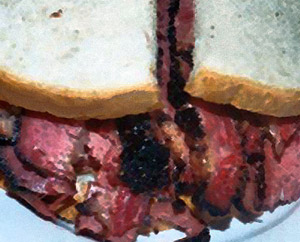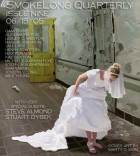Their pale plump skins scorched almost to bursting, the Thuringers invited a plaster of brown mustard.
The pastrami was decked out in zooty 1950s colors: blushing pink meat crusted in black pepper.
There was corned beef, kosher franks, dangling salamis, tukus, and two kinds of knishes—thin kasha and golden squares of potato—kraut, slaw, paprika-dusted potato salad, green tomatoes, Kaiser rolls, French bread, pumpernickel. I’d been walking around all day in the cold and it all looked good. But finally, when my turn in line arrived, I decided to invest my last four dollars in the brisket on rye.
“Young man, I’m gonna make you a very nice sandwich,” the old, bald server, wearing a stained white apron, murmured.
He said it conspiratorially, his lips barely moving, drawing me towards him in order to hear as if it was something that he’d rather the owners of the establishment not get wind of. A secret between the two of us, not for the ears of the others behind me in line.
He glanced up into my eyes and held them as if he’d taken a personal interest in me, which was more than I could say for the secretaries and people in personnel offices where I’d spent the last six weeks filling out applications for jobs while my money ran out and I moved from friend to friend crashing on floors and sofas. His face was old, crosshatched with lines. He must have been making sandwiches for a long time, must have seen a lot of hungry faces staring back at him on the other side of the glass partition.
Maybe he’d learned to read faces at a glance and could read in mine that a desperation I’d never felt before was setting in. That I needed a helping hand. That I’d caught enough of a glimpse of what it meant to be down, homeless, jobless, walking the streets hungry to last me a long time.
Or maybe to get through the day he allowed himself now and then to take a liking to the face of a perfect stranger. A face that perhaps reminded him of himself when he was young, or of someone in his past, the way that, riding the subway and watching all the people with jobs filing on, I’d sometimes see a woman who would remind me of an old girlfriend in another city, a city I should have stayed in, a girlfriend I should have stayed with. That same girlfriend who once told me, “You’ve got a working-class face.” Maybe he thought so, too.
“See,” he said, delicately trimming off the fat with the tip of this carving knife, then scraping the trimmings across the cutting board counter, leaving a trail of grease. That’s when I noticed the numbers tattooed on his wrist. I’d seen the faded marks of the death camps on the wrists of tailors in this neighborhood before. Each time I saw those tattooed numbers still shocked me into an unwelcome sense of dissociation as the brutal reality of history crowded out the mundane present. I wondered what he thought when he looked at his wrist every day. What horrible memories he had to overcome each morning. When I saw those numbers I felt ashamed. So I was spending my last four dollars—big deal. I’d survive.
“How about some nice scraps for your dog,” he asked, gesturing with his knife to the pile of trimmings that he’d been accumulating from other sandwiches. Attached to the fat were hearty looking ribbons of brisket. There was at least another meal there.
“Sure,” I said.
“Okay,” he said, still with that confidential tone as if something preferential was going on between us.
Working in a practiced methodical sequence, he wrapped the trimmings up in waxed paper, and the waxed paper in a sheet of brown butcher paper which he expertly folded into a neat packet before taping it at the edges and handing it towards me. “Only two dollars.”
“Two dollars?”
“For your dog,” he said.
I thought he’d been offering to give them away and suddenly I felt like a total fool. All at once it struck me that whatever had made me naïve enough to think the scraps might be free was the same impulse that had landed me in my current situation: out of work, living from friend to friend, missing a woman in another city who’d already given up on me.
“I don’t have a dog,” I told him.
“You just said you had one.”
“I used to have one.”
“You forgot you don’t have a dog anymore?” He couldn’t get over that someone could make such a mistake.
“I had a dog but he died. I still say yes out of force of habit.”
“I’m sorry to hear about your dog.”
“Thanks,” I said, “he was a schnauzer named Yappy. He sure would have liked those scraps.”
“Maybe you have a cat?”
“No cat,” I said.
“You sure now?”
“Positive.”
“Want a garlicky pickle with that?”
“How much” I asked. I’d learned my lesson.
“Comes with the sandwich.”
“Brisket” was originally published in Alaska Quarterly Review and appears here by permission of Stuart Dybek.



 The SmokeLong Grand Micro Contest (The Mikey) is now an annual competition celebrating and compensating the best micro fiction and nonfiction online.
The SmokeLong Grand Micro Contest (The Mikey) is now an annual competition celebrating and compensating the best micro fiction and nonfiction online.